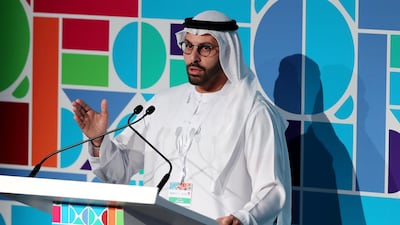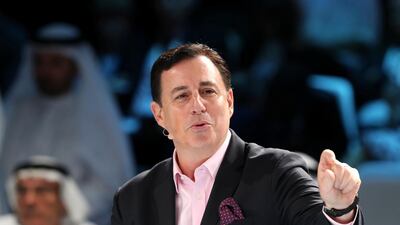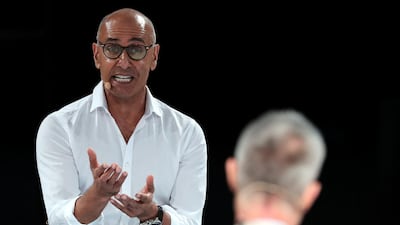On Sunday, the Culture Summit Abu Dhabi returns with a more extensive programme than ever.
Although it may not be the longest event so far, programme curator Reem Fadda says it will be the most engaging.
It will also be a return to in-person programming after two years of online events during the Covid-19 pandemic.
In just five years, the summit has grown from a noble idea into a staple of the international cultural calendar.
The first Culture Summit, which ran for five days at Manarat Al Saadiyat, was titled The Creative Mind of the Connected World: Culture as a Change Agent in the Digital Age.
Three hundred representatives from the worlds of government, art, heritage, science and the non-profit sector convened to discuss how culture could address social and political challenges.
During one of the key sessions, Zaki Nusseibeh, Cultural Adviser to the UAE President, said that culture in the country was “the driving force that enables societies to achieve durable development”.

Nusseibeh explained how the UAE’s Founding Father, the late Sheikh Zayed bin Sultan Al Nahyan, established the first tourism department and museum in Abu Dhabi as early as 1969.
“The first 40 years of the UAE have been the initial phase of laying the foundations and structure, and now we are moving to the global stage where big museums and global entities are making Abu Dhabi and the UAE their home.”
Mohamed Al Mubarak, chairman of Abu Dhabi's Department of Culture and Tourism, rounded off the event by saying: "Abu Dhabi today has become the perfect place for the meeting of cultural leaders from over 80 countries from around the world, as it is home to over 180 nationalities, representing its social and cultural fabric."
The 2018 edition of the Culture Summit was titled Unexpected Collaborations: Forging New Connections Between Heritage and Innovation, Near and Far, Creativity and Purpose.
One of the key ideas behind the event was an exploration of how art and culture could be used to bring about positive social change.

The event added new elements, becoming available to the public online, with more Middle East artists, and an incubator programme catering to 50 artists of all disciplines.
As the summit ended, the current Minster of Culture and Youth, Noura Al Kaabi, said: “Once again, Abu Dhabi has succeeded in bringing together visionary leaders from all over the world to send one unified message: it is never too late to take action and redefine the role of culture in our world.
“We will continue to use the transformative power of culture as an agent for change, bridging nations and minds.
"Abu Dhabi has taken this path since the days of Sheikh Zayed, and it is this generation’s mandate to actively spread his message of tolerance and universality through worldwide co-operation and collaboration, to shape a better future for all."
Titled Cultural Responsibility and New Technology, 2019’s event featured panel discussions, performances and interactive workshops, created in collaboration with five cultural partners from across media, heritage, arts, museums and technology.

The Economist Events looked at issues related to media, information and its policies; Unesco addressed the roles of heritage in societal change; and the Royal Academy of Arts confronted pressing issues in the international art world.
The Solomon R Guggenheim Museum and Foundation looked at how museums affected the future of culture and Google contributed to the exploration of technology’s effects on arts, culture and the media.
Speaking before the third Culture Summit, Al Mubarak said: "This third edition of the Culture Summit aims to continue the great strides we have made over the last two years, partnering with esteemed global leaders in relevant fields of cultural awareness and intellectual development.
"The programme examines how the cultural forces of arts, heritage, media and technology can be used to incite tangible, positive change, in the context of our increasingly globalised and rapidly changing society.”
In 2020, the Culture Summit hoped to explore culture’s potential to transform communities and to bolster economies worldwide.
But as Covid-19 ground the world to a halt, the event persevered, continuing in an online format.
Themed Alone Together: Culture and Resilience, the forum tackled the social, economic and psychological effects of the pandemic on culture and people in the creative fields.

At the start of the summit, Al Mubarak said the live-streamed summit was a complete "first" for him, describing the cancellation of the in-person event as a “tough” and “disheartening” decision.
"In this time of great anxiety and isolation, culture provides a sense of purpose and solace," he said. "We've seen during these difficult times how powerful culture can be. It is a medicine."
Participants such as Alexandra Munroe, a senior curator at Solomon R Guggenheim Museum and Foundation, explored how the early months of the pandemic had affected culture and what lessons could be learnt.
"People are choosing to give [money] to the medical system and how can we argue against that?" Munroe said.
"I would say our biggest challenge is to stay relevant and to be relevant, and to find new ways to be relevant.
"We need to be nimble, we need to be imaginative and we need to be responsive, and in this case more than others, we need to be responsible."
It is a lesson the summit took to heart, returning in 2021 again in online format.
Reem Fadda, the director of the Cultural Foundation in Abu Dhabi, explained how the pandemic forced the institution to adapt.
“We had to reformulate our priorities to support our artists and our industries,” Fadda said.
“We have had to reroute funding to make sure that we persist their livelihood, as well as our built infrastructure and community.”
Tim Marlow, director of the Design Museum in London, said: "While I am naturally optimistic and I think that there's a growing sense of urgency before and now only accelerated by Covid-19, we do have to face the fact there is still catastrophe in all parts of the world, particularly in the Global South, that we need to watch for and culture will be the victim of that."
With the world still reeling from the pandemic, the event explored the effects of Covid-19 on the cultural economy, alongside culture’s relationship with issues of migration, sustainability, inequality and more.
This Sunday, the event returns to its in-person programming, to devise creative solutions to the challenges facing the post-pandemic world.
The programme draws on a line of themes and approaches orientated towards a new world emerging from the shadow of the pandemic.
“The Culture Summit has always tried to programme itself in a way that addresses the urgent issues of our time,” Fadda told The National.
This year’s theme is A Living Culture, which she calls “an obvious topic” for this time.
“I think this is an issue where living culture becomes very important in our moment, in post-Covid, to think about aspects related to how we, as institutions, and as people, are working in the cultural sphere and persevering.”
The Culture Summit runs from October 23 to 25 at Manarat Al Saadiyat, Abu Dhabi.
Scroll through images of the last in-person Culture Summit below



















